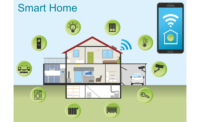Parks Associates: 16% of U.S. Internet Homes Now Have Smart Thermostats

Image by Gerd Altmann from Pixabay
Adoption of smart thermostats increased to 16 percent by the end of 2022, as 62 percent of U.S. internet households say their electricity costs are too high, according to Parks Associates.
In a new white paper released in partnership with Resideo, Parks Associates examines practical solutions and the latest advancements in smart home technology that contribute to energy management. Examples include smart blinds that adjust automatically to optimize natural light, smart lighting systems that respond to occupancy, and intelligent electrical panels that allow for precise control over home energy usage.
The challenge across industries is to create a unified experience for consumers, where multiple devices are interoperable and integrate with utility demand response and time-of-use programs, according to Parks Associates, which conducts ongoing quarterly research of 8,000 U.S. internet households.
The white paper, “The Power Play: Uniting Smart Devices for Home Energy Management,” highlights the current consumer demand for energy efficiency and strategies to deploy comprehensive, interoperable energy management solutions for U.S. households.
“Rising costs are motivating consumers to seek out energy-efficient solutions, but the lack of interoperability between different brands and generations of smart devices poses a significant barrier to effective energy management,” said Jennifer Kent, vice president, research, Parks Associates. “In addition, utilities and energy providers would gain extensive insight and ability to optimize energy usage if energy devices such as solar inverters, smart thermostats, room sensors, and smart blinds work together.”
Resideo collaborates with industry groups to help guide interoperability standards adoption that will deepen the company’s whole-home energy management platform, impact electric grid stability and enable simplified electrification, according to Linsey Miller, senior vice president, business development and strategic marketing, Resideo.
“The Resideo Energy Management team, together with utilities, providers and other smart appliance brands, can help deliver more comfortable and efficient homes to curb consumer costs and decrease overall energy use,” she said.
“The Power Play” highlights the barriers and opportunities that exist in making optimized whole-home energy management a reality. Beyond detailing technological capabilities, the white paper is said to examine the broader implications for various stakeholders in the energy sector, including the benefits to energy providers, device-makers, and retailers, and charts a course for the future development of these critical technologies.
Looking for a reprint of this article?
From high-res PDFs to custom plaques, order your copy today!





